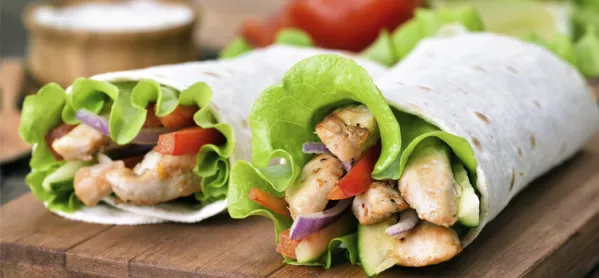- Home
- Why an A-level class is like a chicken fajita
Why an A-level class is like a chicken fajita

Year 12 A-level classes are like chicken fajitas. You know this already, but let me remind you.
A chicken fajita, to be successful, needs to contain some nice absorbent chunks of chicken. They are the staple ingredient: no successful chicken fajita can manage without them. Every Year 12 English literature class needs its ‘chicken chunks’.
These are the students who have always enjoyed reading books; who were always willing to give weird new genres a try at KS4; and who generally humoured you in your desire for correctly placed apostrophes. Solid. In the right place in an A-level Eng. lit group.
But, a self-respecting chicken fajita will also contain several other ingredients.
Take sour cream (or low-fat yoghurt, if you’re a disciple of Jamie). This mucus-inducing ingredient gives an edge to your fajita. It is supremely cool, but can undermine the other flavours ̶ especially if you don’t spread it around a bit. My Year 12 seating plans are created with sour cream students in mind.
Then there’s the guacamole. A chicken fajita can manage without it, but it wouldn’t make such an impact on the taste buds. The students with guacamole tendencies do not necessarily show themselves in every lesson. But they are there, lurking greenly, until the appropriate moment arises.
I have a fond guacamole memory of an English literature student quoting extensively from Wole Soyinka; another of a drama student spontaneously improvising a scene from Mother Courage ̶ with running commentary. #verfremdungseffekt #impressive
‘It’s the salsa moments you remember’
Another staple ingredient? Salsa. This adds some heat to the dish and makes it memorable. A bland chicken fajita will not ruin your life. But it will be more exciting if it contains a bit of piquancy, and Year 12 classes are the same.
Cast your minds back: I’ll bet it’s the salsa moments you remember. A personal favourite was the pair who were devising a drama piece on women and power. Their improvisation left me experiencing my own ‘personal summer’ (how I wish I’d coined that phrase). When they had finished *cavorting*, I apologised for my menopausal response, and asked them to explain themselves. Artaud, apparently. Theatre of Cruelty.
That’s okay, then. The odd thing was that I would have had both students down as chicken chunks. Shows what I know.
I must, by now, have reached the cheese. Mature cheddar is best. It is rich and strong, and knows its own strength. Too much mature cheddar on one little fajita can overwhelm it, but a sprinkling of the right amount works wonders.
I think back to a sociology student who waited for the first mention of the embourgeoisement thesis and let rip about class war. We had to ask him to tone it down a bit, after a while, but his timely intervention provided a soupçon of tanginess to enliven a tricky subject.
And our penultimate ingredient? Cardamom seeds.
Wait, what? Chicken fajitas aren’t meant to contain cardamom seeds. But that’s my point. Every Year 12 class contains elements that should ideally not be there.
Sounds harsh? Well, I have stood in front of English literature students who have not read a novel from choice since starting secondary school. I have stood in front of nauseous Year 12 drama students whose parents thought that doing drama would “give them a bit of confidence”. I have stood in front of Year 12 sociology students who had heard the subject was “easy”, and they were sitting on very dodgy ‘wind-assisted’ Cs from KS4. I have stood in front of students whose reputation for disruption was legendary.
Other members of the class would visibly flinch as the cardamom seeds swaggered in. As a teacher, if you bite down on one, it lingers in the memory. So you pick ‘em out and pile ‘em up on the side of your plate as best you can. But most secondary school inclusion rooms are not designed with Year 12s in mind…
Defying classification
And what about my final category? Well, I’m not sure that I can take this particular extended metaphor any further. And this is why.
Every September, I find myself reflecting on the first day of term, many years ago, when I didn’t know as much as I thought I did.
I decided to hit the ground running with a new Year 12 tutor group, and we soon found ourselves deep in conversation about extended families living under one roof. After a bright and breezy discussion, I sent them on their way to morning break.
But one student stayed behind. For some reason, my empathy antennae had been switched off that day. I had missed all the signals.
She described to me in no uncertain terms why she found the topic of extended families living together under one roof difficult. She couldn’t understand how I had not picked up on her misery and discomfort over the previous 50 minutes. And she never came back.
A-level classes are like chicken fajitas. But there are some students that defy such facile classification - and it’s the memories of those students that will stay with me forever.
Fran Nantongwe works in a comprehensive school in Norfolk.
Want to keep up with the latest education news and opinion? Follow TES on Twitter and like TES on Facebook
Keep reading for just £1 per month
You've reached your limit of free articles this month. Subscribe for £1 per month for three months and get:
- Unlimited access to all Tes magazine content
- Exclusive subscriber-only stories
- Award-winning email newsletters
